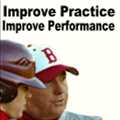Baseball Drills - It's Like Brushing Your Teeth - Do It!
By Nate Barnett
Have you ever gone to the dentist (I certainly hope so) and sat in the chair and had the question, "So, have you been flossing?"
If you're like me and don't want to admit you haven't been flossing as much as you should, your answer is probably much like
mine. "Ya, doing pretty well with that." All the while avoiding eye contact. The funny part of the deal is that the hygienist
is flossing the swollen and red gums as the question is asked! How dumb can I get?
This example, as disconnected from baseball drills as anything, does serve as a valuable illustration in relating to the
importance placed on hard work in practice. The message is clear. If you skimp on the drills, your game will end up rotten
over time.
So why am I writing an article on a topic that seems so obvious? Because while it's obvious on the observation level, there
is an unbelievable amount of athletes who have major mechanical problems with quite a few parts of their game. There are only
a few reasons for this:
1. The athlete hasn't developed yet and coordination/body control is difficult to keep consistent. Most of the time this
"problem" will improve as time goes on.
2. The athlete has received poor coaching and poor advice regarding what baseball drills will improve his game. However,
with the advent of the internet age and the information it provides, this is becoming less and less of an good excuse.
3. The athlete is lazy and cannot see the need for baseball drills and does not put in the work necessary.
While the third may seem harsh, I find that this is generally the most common of the three reasons for ignoring baseball
drills. I have also found that the attitude of achievement and hard work many times has to be cultivated within an athlete.
Sure, there are those players who just have an ability to stay disciplined and focused, but it's only the minority in number
who possess this ability.
So how do we as coaches and parents begin to cultivate this desire to work hard within athletes. I wish there was a clear
cut and easy answer, however, there is not. There are many ways to achieve this, let me share some of my personal favorites.
A. In the home or on the field (or both), the attitude of achievement and personal development must be present. If players
understand that it is expected to always be in a state of practice and development, they will be more likely to work hard
themselves and enjoy the process.
B. Coaches must emphasize the importance of baseball drills. One of the best ways to accomplish this is to make sure practices
run smoothly and quickly, without a lot of down time or wasted time. There are few things more irritating to players than
having a practice or a coach that is disorganized and without direction at practice.
C. Leadership among the players themselves will play a large role in the importance a team places on baseball drills and
overall effort. If a handful of players set the example of discipline and going the extra mile, the rest of the team will
usually follow right along.
About the Author
Nate Barnett is owner of BMI Baseball http://bmibaseball.com and is based out of Washington State. His expertise is in
the area of hitting, pitching, and mental training. Coach Barnett's passion is working with youth in helping expand their
vision for their baseball future. After finishing a professional career in the Seattle Mariners Organization, Nate pursued
his coaching and motivational training career. His instructional blog is located at http://bmibaseball.com/blog
His new FREE ebook, Toxic Baseball: Are you polluting your game? can be found on the main BMI Baseball website.
Hitting 101, an ebook on complete hitting mechanics will be released by June 1st, 2008. Features include numerous illustrations,
video clips, and a special offer to discuss your hitting questions over live on the phone strategy sessions.

